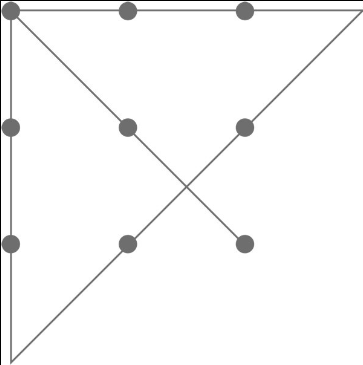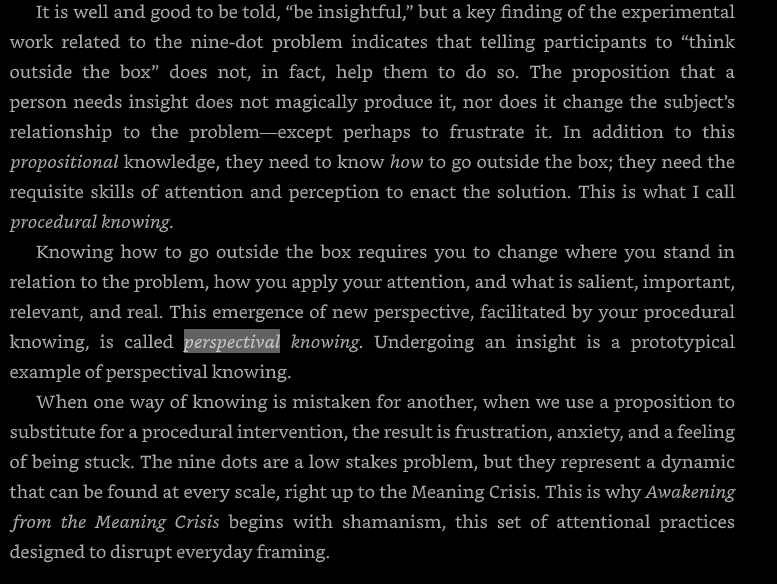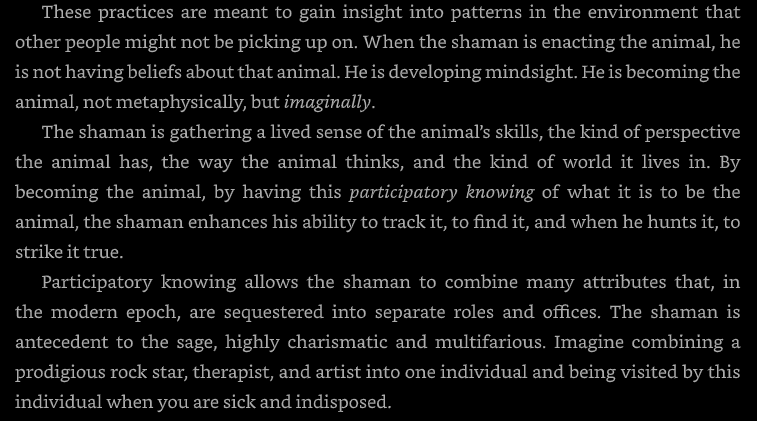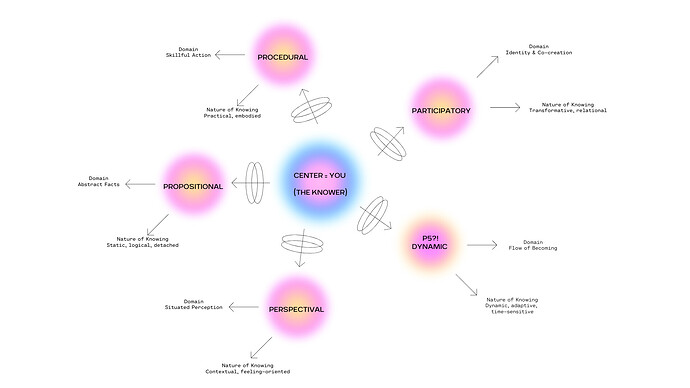After reviewing my notes on the lectures, I was able to sum a sort of excerpt segments of the 4 kinds of knowing Vervaeke talks about, also this video sums it up pretty clear: Why There Are Actually Four Ways You Can Know Something
Procedural Knowing
(knowing how to do something)
“Procedural knowing is knowing how to do something. It’s your skill knowledge. Knowing how to catch a ball. Knowing how to speak a language. Knowing how to play the piano.”
“Procedural knowing is knowledge that is expressed in skills, in abilities that you can perform.”
Perspectival Knowing
(knowing from a situated perspective, salience landscape)
“Perspectival knowing is how you are situationally, perspectivally connected to your environment. It’s your sense of presence, your salience landscaping, your sense of what’s standing out to you right now.”
“Perspectival knowing is knowing what it’s like to be here now, from this point of view, with this field of affordances.”
(“Affordances” = opportunities for action that the environment offers you.)
Participatory Knowing
(knowing by being, mutual shaping of agent and arena)
“Participatory knowing is not something you have… it’s something you are. It’s how your identity is bound up with how the world is disclosed to you, and how you are disclosed to the world. You are participating in the co-creation of the agent-arena relationship.”
“Participatory knowing is the kind of knowing that is grounded in your being. It’s not just about how you frame the world… it’s about how you are fundamentally connected to it.”
Propositional Knowing
(knowing that something is the case — statements, facts)
“This is the kind of knowing most familiar to us. Propositional knowing is knowing that something is the case. It’s captured in statements, assertions, descriptions.”
“Propositional knowing is knowledge in the form of truth claims… beliefs that can be true or false.”
Exploring the roots of John Vervaeke’s 4Ps of knowing, propositional, procedural, perspectival, and participatory, reveals that while the first two are well-established in classical epistemology, the latter two open a deeper, embodied understanding of cognition!
- Propositional Knowing: “knowing that” facts, logical truths.
- Procedural Knowing: “knowing how” skills, practices.
- Perspectival Knowing: “knowing what it is like” situated perception, context. (embodied and felt orientation)
- Participatory Knowing: “knowing through being” co-shaping of self and world. (world-creating, distributed across systems)
Insights from enactivism (Varela, Thompson, & Rosch, The Embodied Mind), extended mind theory (Clark & Chalmers, “The Extended Mind”), and process philosophy (Whitehead, Process and Reality) suggest we can take this even further by adding a fifth dimension! Some sort of Dynamic Knowing* (5th P maybe?!) Knowing through participation in the ongoing flow of transformation. In this view, knowing is no longer static or representational; it is living, felt, relational, and time-sensitive. The knower is not separate from the world but co-evolves with it, constantly attuning to the rhythms of becoming. This dynamic framework offers a richer epistemology for our age, one capable of responding to complexity, uncertainty, and the deep need for meaning.
Key Ideas:
- Reality is not made of objects, but of evolving events.
- Knowing is inseparable from timing, rhythm, adaptation.
- “Truth” is not just correspondence; it is attunement to the evolving real.
Center = You (the knower)
Around you, dynamic flows connect:
The model is not hierarchical. It’s a living system sometimes you operate mainly propositionally, sometimes processually, depending on what life demands.
This “5Ps” model points toward a new epistemology:
- Rooted in embodiment.
- Open to altered states and multiple modes of being.
- Responsive to complex, evolving systems (ecological, social, technological).
- Emphasizing transformation and adaptation, not just static truth.
In a way, it’s an epistemology for the meaning crisis:
It restores being, feeling, doing, and transforming to our sense of what it means to “know.”
Knowing is not just representing reality.
It is participating in, perceiving from, practicing with, proposing about, and processing the real.
*Please note that I am presenting the concept of dynamic knowing as preliminary reflections and in-process field notes from the frontier of emerging thought.



